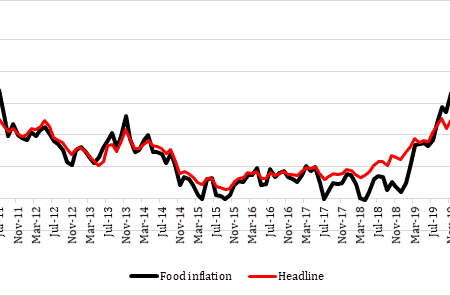
Minimum Support Price (MSP) of Wheat and Inflation
Pakistan’s Wheat Pricing
Wheat is one of the most strategic crops globally, which has always been a big challenge for many governments. Over the last few months, Pakistan’s government is struggling to fix wheat prices in the country due to weak governance and mismanagement. For the current price of PKR. 1,400/-, the market price of wheat was PKR. 2,256 per 40 kg in the first week of October.
To ensure a smooth supply of wheat and incentivize farmers to produce more, the Pakistan Agricultural Storage and Services Corporation (PASSCO) procure wheat on a minimum support price (MSP). This price is determined based on the excess and shortage of wheat supply in Pakistan. Through the MSP, farmers will receive a fair amount of price for their upcoming crops to invest in agricultural commodities production.
The Ministry of National Food Security and Research suggested that wheat’s support price should be increased to motivate farmers to increase wheat production in the future. The Economic Coordination Committee (ECC) consulted Ministers and Special aides to conclude whether the support price should be increased by 25%, i.e., from Rs1400 per 40 kg to Rs1745. Food prices are climbing fast in recent months, posing a possible threat to the poor livelihood. Furthermore, food inflation remains the major contributor to the various inflation episodes over the last ten years (see Figure 1).

Source: PIDE estimates
Wheat and Food Inflation
Wheat and wheat flour remain the primary drivers of the recent episode of food inflation. Notably, wheat inflation was deriving food inflation in most cases (see figure 2) over the last ten years. Recently, the government is going to announce an increase in the MSP of wheat. It is essential to review the inflationary consequences of any price change in the wheat. This brief aims to evaluate the impact of an increase in MSP on average inflation.

Source: PIDE estimates
We find a low correlation between MSP and food inflation as compared to retail wheat prices. More interestingly, retail wheat inflation was even negative in 2014 and 2015 when the government increased MSP from 1200 to 1300. Furthermore, the retail wheat price is much higher than MSP; therefore, we shall not see the complete pass-through of the MSP increase in inflation.
Wheat MSP and National Inflation
We develop several scenarios for the impact of wheat minimum support price increase National Inflation in the baseline case. Our findings suggest that if the government sets PKR 1750 MSP, it will increase inflation by 29 bps. However, a bumper crop and good governance may reduce the pass-through on inflation and vice versa. Therefore, the government has to have reasonable control over the administrative side to have a minimal impact on food inflation.

Source: PIDE estimates
Conclusion and Policy Implications
- The retail wheat price is much higher than the proposed MSP; therefore, we shall not see the complete pass-through of the MSP increase in inflation.
- If the government sets PKR 1750 MSP, it will increase inflation by 29 bps. However, a bumper crop and good governance may reduce the pass-through on inflation and vice versa. Therefore, the government has to have reasonable control over the administrative side to have a minimal impact on food inflation.
- The government must take appropriate measures to reduce the gap between wheat MSP and retail price. The government should promote competitiveness in the wheat market to reduce market distortion costs and avoid illegal trading. The cost of wheat production is high, with low productivity in Pakistan than neighboring countries India and Iran. The government can tackle inflationary pressures by promoting competitiveness in the wheat market. Anjum and Zia (2020) argue that high yielding and relatively low-risk varieties need to be introduced by involving the private sector. Knowledge-based innovations and interventions will increase competitiveness, ensure future food security, and reduce trade deficit (Anjum, 2020).



